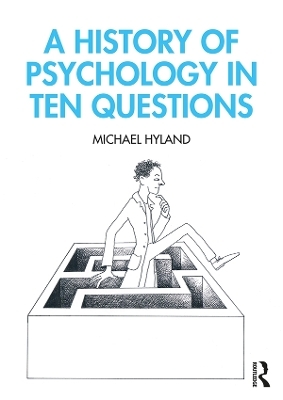
A History of Psychology in Ten Questions
Routledge (Verlag)
978-0-8153-6507-5 (ISBN)
- Titel erscheint in neuer Auflage
- Artikel merken
This student-friendly book on the history of psychology covers the key historical developments and controversies in all areas of psychology, linking history to the present by focusing on ten conceptual issues that are relevant today.
How did psychology become a science, and what kind of science did it become? How do psychologists measure and explain the fact that in some ways everyone is unique? Is psychoanalysis scientific? Why did cognitive science replace behaviorism? This book addresses all these questions and more, covering the whole range of psychology, from neuroscience and artificial intelligence to hermeneutics and qualitative research in the process. Drawing on the author’s experience of how to make the subject interesting for students, the book is structured around ten key questions that engage with all the core areas of psychology and the main schools of thought. Showing how each of the different approaches or paradigms within psychology differ not based on data but on assumptions, Michael Hyland provides an engaging introduction to debates from history and in contemporary society.
Including boxed material on hot topics, historical figures, studies/experiments, and quirky facts, this is the ideal book for undergraduate students of psychology taking CHIPS and other history of psychology modules.
Michael Hyland was as a lecturer and later professor of health psychology at the University of Plymouth, retiring in 2018 after 44 years teaching history and theory in psychology. He is currently part-time professor of health psychology at Plymouth Marjons University.
Preface
1. What is science and what do scientists do?
2. How did psychology become a science and what kind of science did it become?
3. How did psychology become an applied science and what is the relationship between applied and non-applied psychology today?
4. Why did behaviourism occur, what forms did it take, and why and how was it replaced by cognitive psychology as the dominant paradigm in psychology?
5. Is psychoanalysis scientific, what are its assumptions, why is therapy effective, and what is the legacy of psychoanalysis today?
6. What is the relationship between psychology and physiology, will neuroscience replace psychology and what is biopsychosocial interactionism?
7. How has the heredity-environment controversy been represented in the history of psychology and how is it informed by the person-situation debate and modern understanding of epigenetics?
8. How do psychologists measure and explain the fact that in some ways everyone is unique?
9. What are the assumptions of psychologists who use qualitative research methodology and what are the alternatives to treating psychology as a natural science?
10. Is the whole greater than the sum of its parts? From gestalt psychology to artificial intelligence
11. The changing assumptions of psychology
References
Index
| Erscheinungsdatum | 06.12.2019 |
|---|---|
| Zusatzinfo | 8 Line drawings, black and white; 10 Halftones, black and white; 18 Illustrations, black and white |
| Verlagsort | New York |
| Sprache | englisch |
| Maße | 174 x 246 mm |
| Gewicht | 585 g |
| Themenwelt | Geisteswissenschaften ► Geschichte |
| Geisteswissenschaften ► Psychologie ► Allgemeine Psychologie | |
| ISBN-10 | 0-8153-6507-1 / 0815365071 |
| ISBN-13 | 978-0-8153-6507-5 / 9780815365075 |
| Zustand | Neuware |
| Informationen gemäß Produktsicherheitsverordnung (GPSR) | |
| Haben Sie eine Frage zum Produkt? |
aus dem Bereich



